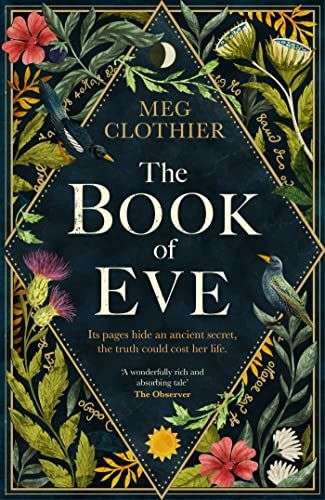We’ve implemented some new protocols around sending us messages via this website. Please email website “at” britishfantasysociety “dot” org for any issues.

For all things fantasy, horror, and speculative fiction
-
Announcement:

The Book of Eve by Meg Clothier
The Book of Eve by Meg Clothier
The Book of Eve by Meg Clothier
Wildfire, ebook, £7.99
Reviewed By Tori Borne

Beatrice lives a disciplined and virtuous life as the Sister Librarian of her idyllic convent; her days are filled with prayer and exquisite books – until two dying women speaking in a foreign tongue arrive at the doorstep of the convent, bringing with them an invaluable book that will change everything. Beatrice keeps the book against her better judgment, hearing its whispers and wanting to unravel the secrets held within its blank pages. The book calls to her, it protects her, and it endangers her, as its heretical existence threatens the reputation of her convent and the lives of the women who live there.
Taking inspiration from the elusive Voynich Manuscript and its mysteries, Meg Clothier delivers an empowering tale of knowledge, faith, and female unity with her third novel, The Book of Eve. The story follows our protagonist, Beatrice, as she begins to unleash the magic of the strange book and question the restrictive society in which women are viewed as embodiments of sin. Utilising the authoritarian regime of the Faith of the Father and Son, Clothier explores the confinement of women within religion and the fear that women with power evoke in the hearts of men whilst solidly showcasing the true value of female empowerment – but most importantly – solidarity and sisterhood. As the women of the convent stand together against the oppressive men within their faith and demand autonomy, they discover their own internal strength and refuse to be subdued and shamed anymore.
Fans of dark academia and feminist novels will find Clothier’s work a real treat as it is packed with literary and classical allusion, with a real focus on the importance and divinity of books. I found this one of my favourite aspects of the novel, and I thoroughly enjoyed the discussion surrounding ‘banned’ books and the small acts of rebellion of characters keeping them in their possession. The novel suffers slightly from a rather slow beginning, but as the story begins to unfold, it is captivating – I found myself unable to tear my eyes away as the plot began to thicken and the stakes began to rise. Furthermore, Clothier gives her characters distinctive personalities and voices but without them feeling like they are overly flanderized. However, with such a large cast of characters to cover, some do almost feel a little caricature in nature as their development is hindered by the novel’s length and the constraints that come with that.
Generally speaking, the book is easy to read, but I did find that the choice of vocabulary at times felt a little superfluous – our main character is indeed a well-read and educated young woman, so this was a trait I could overlook as it befits her, but it sometimes stifled the flow of the prose as a consequence. Despite being set in a small convent, Clothier successfully crafts a world that feels fully realised; her descriptions are detailed and successful in conjuring the environment in the reader’s head. It was easy to become immersed in this small convent and to follow the women in their daily routines, feeling like you were a part of it.
This is a stand-alone novel, and if you are a fan of the dark academia subculture, particularly within the literature, as well as a fan of novels such as The Handmaid’s Tale, I would recommend that you give this one a read.
Explore the blog:
Blog categories:
Latest Posts:
Tags:
#featured (56) #science fiction (25) Book Review (264) events (44) Fantasy (231) Graphic Novel (13) horror (136) Members (62) Orbit Books (48) profile (43) Romance (17) Science Fiction (50) short stories (28) Titan Books (52) TV Review (15)
All reviews
Latest Reviews:
- THE HOUSE ON THE BORDERLAND by William Hope Hodgson
- Monstrum by Lottie Mills
- Mood Swings by Dave Jeffery
- Yoke of Stars by R.B. Lemberg
- Hera by Jennifer Saint
- The Black Bird Oracle by Deborah Harkness
- RETURN OF THE DWARVES By Markus Heitz
- Delicious in Dungeon
- Toxxic by Jane Hennigan
- THIS ISLAND EARTH: 8 FEATURES FROM THE DRIVE-IN By Dale Bailey
Review tags:
#featured (2) Action (4) Adventure (4) Book Review (28) Fantasy (18) Featured (2) Feminist (2) Gothic Horror (3) Horror (14) Magic (3) Orbit Books (3) Romance (6) Science Fiction (5) Swords and Sorcery (2) Titan Books (7)